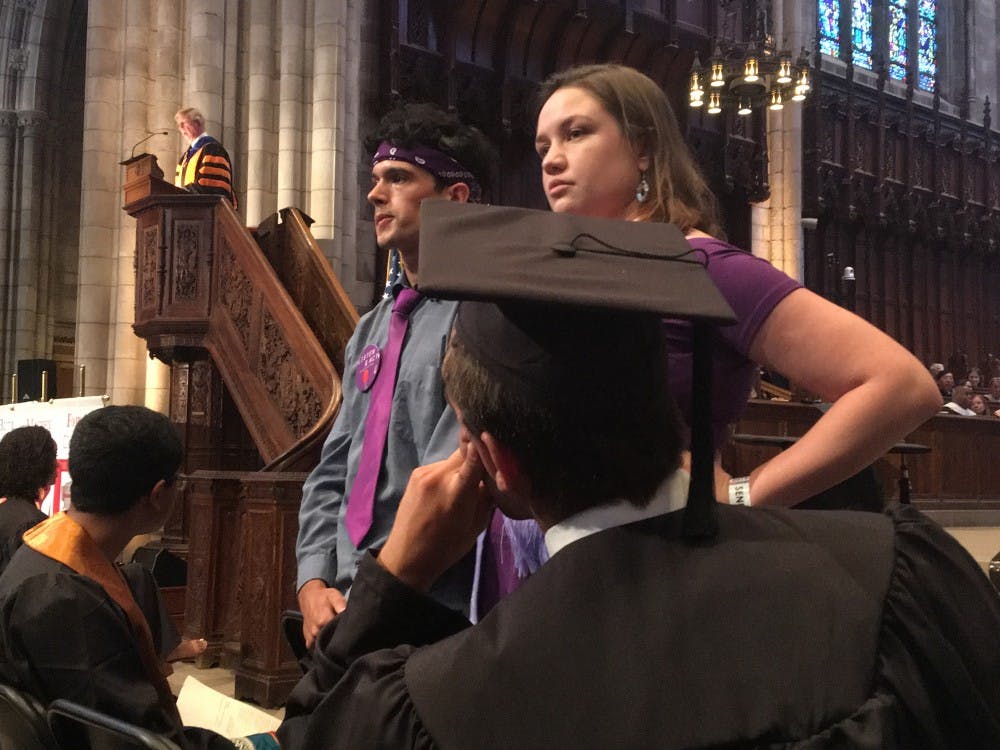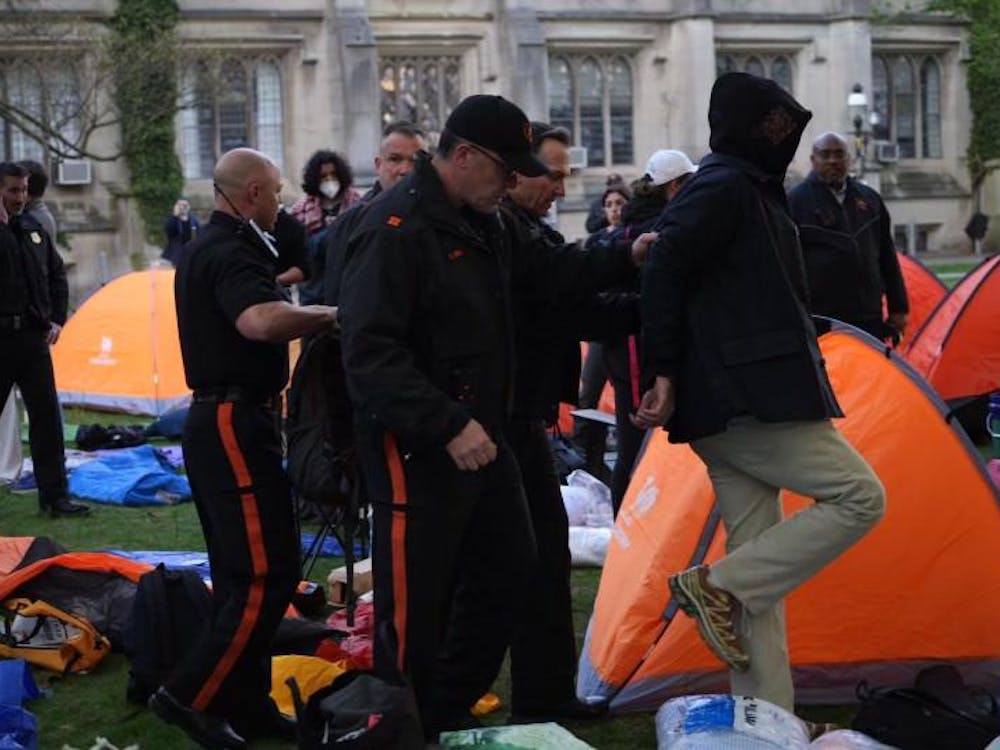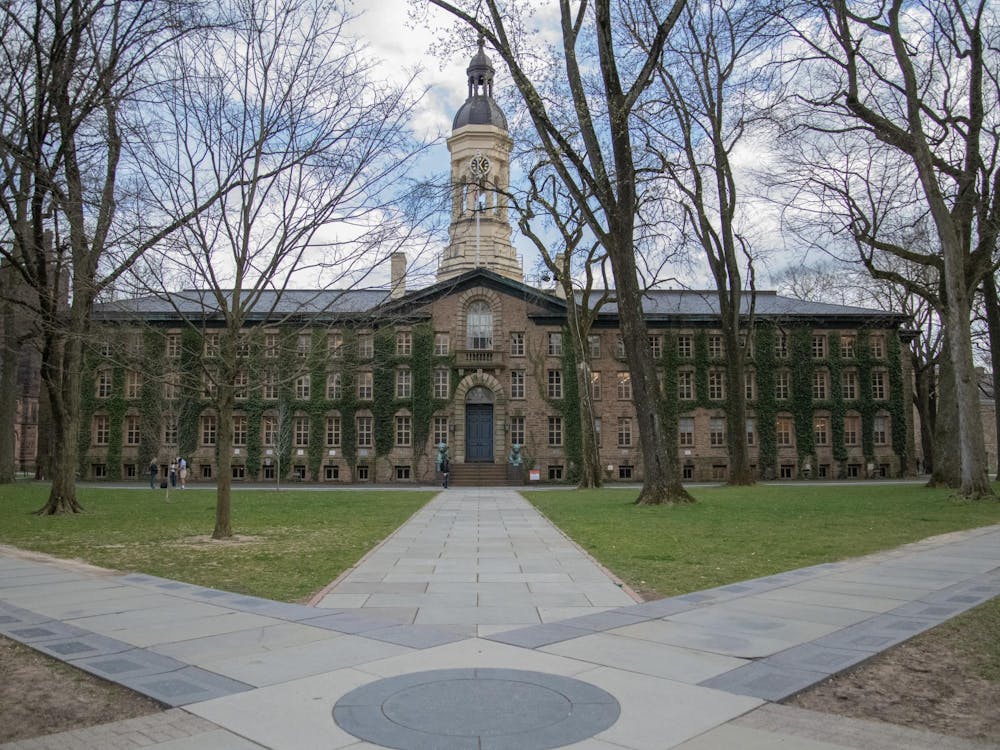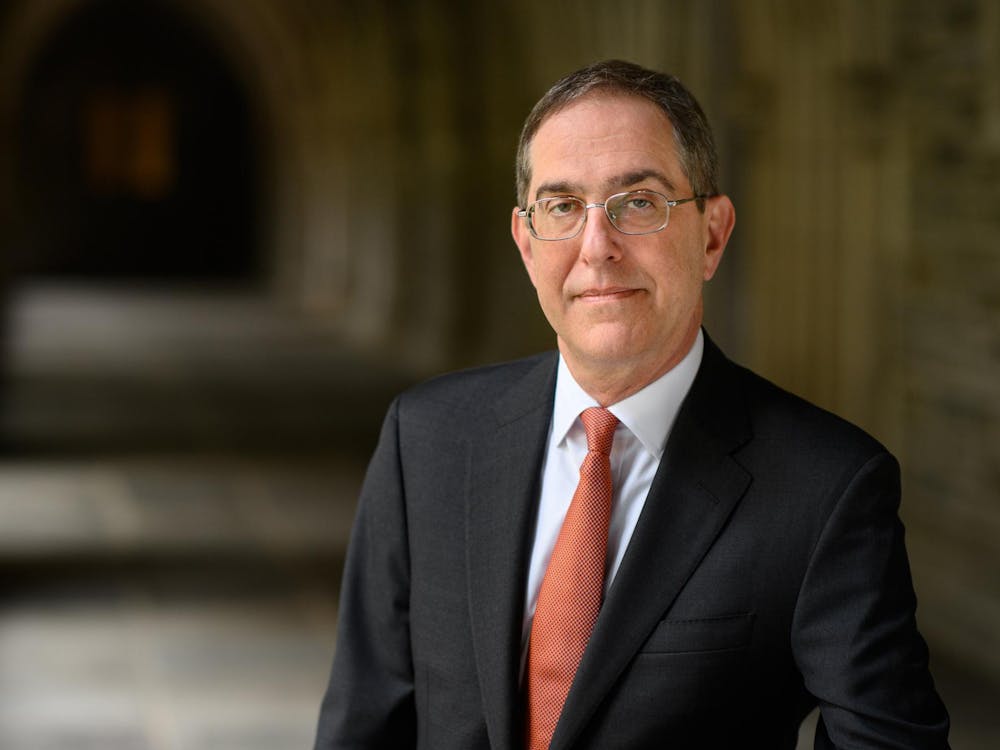At the 2019 Baccalaureate, Pulitzer Prize-winning columnist, author, and guest speaker George F. Will GS ’68 encouraged graduates to practice the virtue of praise. During his speech, Will faced protest from students in response to his past remarks on sexual assault on college campuses.
Will’s baccalaureate address was met with a silent protest from numerous students as part of Princeton IX Now, a coalition of University students who have protested against what they believe to be inadequate adjudications of Title IX procedures by the University administration.
As Will was introduced by President Christopher L. Eisgruber ’83, students involved with the protest — many of whom wore purple to show solidarity — removed their traditional gowns and stood while facing away from Will. As Will’s address continued, more students joined those who were standing in protest.
Will began his address by mentioning his previous graduation address at Sing Sing Correctional Facility, where 37 incarcerated men had just obtained college degrees, recalling that all of the inmates described themselves as having made “bad choices.”
“This recurring phrase, this emphasis on choice,” according to Will, “affirmed their agency, their status as moral actors.”
Will stated that he spoke of this occurrence at Sing Sing because he was alarmed by the “infantilization of America” and what U.S. Senator Ben Sasse (R-NE) called “the vanishing American adult.”
Prior to modern times, Will expressed, children witnessed adults performing work and learned what F. Scott Fitzgerald expressed as “nothing any good isn’t hard.”
“Adults, they learned, do praiseworthy things,” Will said. “And so, the children learned to praise — to admire.”
Will went on to criticize America’s inclinations for “contempt and condescension” as well as the habitual disparagement that occupies what American Enterprise Institute President Arthur C. Brooks called a “culture of contempt.”
“What are called ‘social media’ — and which might more accurately be called anti-social media — seem to encourage snarky expressions of disdain,” remarked Will.
Praise, according to Will, may be an antidote to what he sees as an excessive amount of anger that he said defines contemporary American life.
Will illustrated his point by mentioning an episode in which a Twitter user was overly ready to express anger after misinterpreting three placards of large “K”s — meant to represent three strike outs accumulated by the home team’s pitcher — as in support of the Ku Klux Klan at an Atlanta Braves baseball game.

“I doubt that this person is given to generous praising,” said Will.
To illustrate that point, Will used another baseball anecdote, one that involved the legendary infielder Rogers Hornsby. A young pitcher threw three pitches that he thought were strikes, while the umpire called all three balls. The umpire, recognizing Hornsby’s excellence and habit of never swinging the bat at pitches that weren’t strikes, said to the flustered pitcher, “Young man, when you throw a strike, Mr. Hornsby will let you know.”
Will expressed that the graduating students have attained a standard of excellence that will help them to become praiseworthy as they depart from the University.
Will concluded his speech by citing the lyrics of the University’s alma mater: “Let all with one accord rejoice, in praise of Old Nassau.”
Jamie O’Leary ’19, a participant of Princeton IX Now who also read one of the blessings during the baccalaureate ceremony, told The Daily Princetonian that likely over 200 members of the Class of 2019 stood in protest.
“The board of trustees gave Will — a sexual assault denier — a standing ovation after his reprehensible speech,” wrote O’Leary, “an indication that their priorities lie with their reputation and free speech rhetoric, not with student survivors.
In a statement to the ‘Prince,’ University spokesperson Ben Chang wrote, “We are proud to have George Will, a distinguished alumnus, author, and Pulitzer Prize-winning columnist, as a member of the University community, and we are grateful for the innumerable contributions he has made, including his service as the Baccalaureate speaker for the Class of 2019.”
“We respect the rights of students to share their views in a peaceful manner,” Chang wrote. “We hope every student takes the time to consider the message of his remarks.”
The ceremony began with an invocation, given by Dean of Religious Life and of the Chapel Alison L. Boden, which was followed by the welcoming given by Eisgruber, who quoted from the first recorded University baccalaureate address, given by President Samuel Davies in 1760: “Live not for yourself, but the public, he told [the graduating class].”
Eisgruber applauded the graduating students for upholding the University’s motto of serving humanity.
“All Princetonians take great pride in our shared mission to be in the nation’s service and in the service of humanity,” remarked Eisgruber. “It is a mission you upheld in many ways during your time here.”
Eisgruber went on to urge the graduating students to follow the University’s motto in dedicating themselves to serving the betterment of humanity as alumni.
“As you enter your next stage of life as a Princetonian, I know you have left Princeton better than you arrived, and that you are poised to have the same impact on the world around us,” Eisgruber said.
A number of prayers and songs from various religious traditions followed Eisgruber’s remarks.
The ceremony took place in the University Chapel on Monday, June 2 at 2 p.m.









